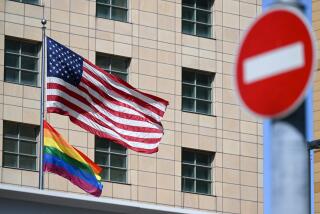Editorial:: Trump’s new travel ban fools no one. It’s the same old bigotry masquerading as national security

The Trump administration said no existing visas will be revoked under the new order. (Sept. 25, 2017)
President Trump’s new and supposedly improved ban on travel to the U.S. from a handful of countries makes a few changes to the previous versions, and in so doing might successfully satisfy a court that its underlying impetus is not an anti-Muslim bias. But even if the Supreme Court ultimately decides that the new ban passes constitutional muster, it’s still bad policy, born of fear, stereotypes and prejudice, dressed up as an effort to protect national security. Even if it is upheld after the inevitable challenges, it’s hard to see how Americans will be any safer, or any better off, because of it.
The new iteration of the old ban still excludes people mostly from countries with Muslim majorities, while adding a few other countries — North Korea, for example — to throw critics off the scent of religious bigotry. But even if we accept (which we don’t) that this isn’t primarily motivated by a desire to keep Muslims out, it’s still not a good policy. On principle, there’s something fundamentally wrong with excluding entire nations of people simply because some people in those countries are radicalized and dangerous. Reverse the scenario: Given the homicide rate in the U.S., and the number of hate crimes committed by white supremacists, why wouldn’t other nations seek to ban entry by Americans? From the outside, and statistically, we are a very violent people. But we would be outraged if other nations judged us all by the Dylann Roofs and Jared Lee Loughners among us.
Citing what it says is a failure by the targeted governments to supply sufficient data on visa applicants, the new ban indefinitely bars immigrants from Syria, Somalia, Libya, Yemen, Iran, Chad and North Korea. The last two countries are new to the list, and Sudan, which had been covered by the previous ban, is no longer listed. But the administration doesn’t explain in any detail in what way the countries are not cooperating or what they must do to come into compliance. And in the end, the list of banned countries is almost the same as the one the administration was already defending in court.
There’s something fundamentally wrong with excluding entire nations of people simply because some people in those countries are radicalized and dangerous.
In addition to barring people who want to immigrate to the United States from the countries above, the new policy bars all tourists and other short-term visitors from North Korea and Syria. But it allows entry by people from the other banned countries under various short-term categories — student visas, say, or business travel.
So what makes a person who wants to immigrate more dangerous than a tourist or visiting businessperson? The government’s explanation is that if a problem should arise, it’s harder to remove someone who has lawful permanent resident status (which includes a path to citizenship) under an immigrant visa than it is to revoke a short-term visitor’s visa. That may or may not be true, but how that differentiation protects us from those who might do harm is hard to fathom. Wouldn’t a wily Yemeni terrorist be just as likely to enter the country on a short-term visa as on an immigrant visa?
Trump is again playing to his political base. The U.S. government, like any other government, has a right and a duty to ensure that people do not enter the country intending to do it harm. If there was evidence to suggest that the protocols for vetting visa applicants before he took office exposed the U.S. to terrorism, Trump might have an argument. But the evidence wasn’t there; as the Cato Institute reported, no one from the original six banned countries has killed anyone in a terrorist attack on U.S. soil since 1975.
It’s perfectly fine to vet people whom we suspect of evil intentions or who come from dangerous places, and it’s fine to impose additional controls if countries aren’t cooperating with our efforts. But Trump is overplaying the problem in order to fulfill an ill-conceived campaign promise, and he’s doing so in a way that will tarnish the nation’s image abroad. The ban does fit into a White House agenda, but it’s not national security. It’s part of Trump’s anti-immigrant ethos, which is reflected in his attitude toward Mexican immigrants, his reported desire to reduce the number of refugees the U.S. accepts and his broad and unfair characterizations of Muslims seeking to come to this country.
So no, we’re not fooled. This is the same old bad policy dressed up in a fall frock, and the nation should recognize it as such.
Follow the Opinion section on Twitter @latimesopinion or Facebook
More to Read
A cure for the common opinion
Get thought-provoking perspectives with our weekly newsletter.
You may occasionally receive promotional content from the Los Angeles Times.






